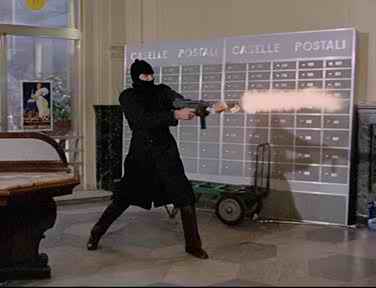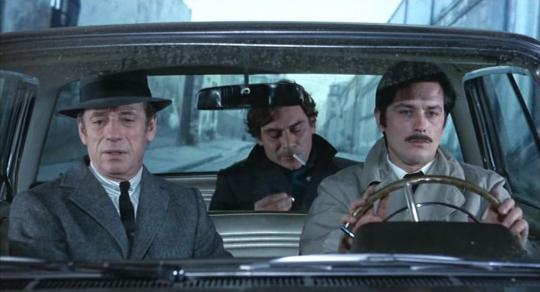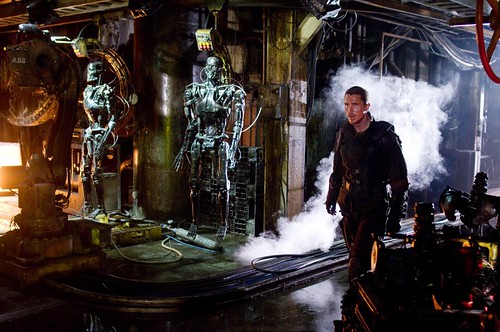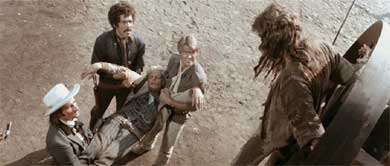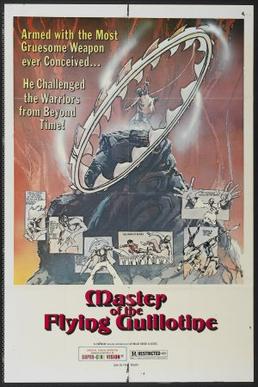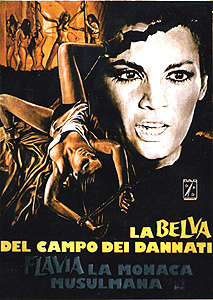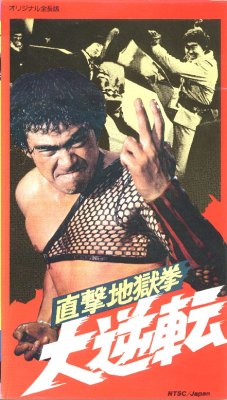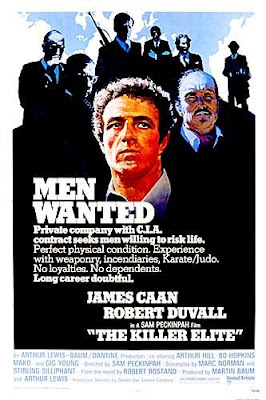Originally posted in movie tab II 25-08-2009.


Hanzo the Razor: The Snare (Yasuzo Masumura 1973)
+
This is the second part of the Hanzo trilogy; an unusual and extremely violent mixture of the Chanbara and Pinku genres. I've had the box set sitting on my shelf for well over six months now, but the first film in the series (
Sword of Justice) didn't really capture my imagination like I hoped it would despite being directed by Kenji Misumi of
Lone Wolf & Cub fame. As a result I kind of put off watching parts 2 & 3, until Fenwick PM'd me a few days back to ask if I knew anything about the series.
Played by the wonderful Shintaro Katsu (best known as the original
Zatoichi) Hanzo is your basic badass police inspector with a misogynistic line in torture, lack of respect for authority, and a penchant for beating his manhood with a wooden paddle. In this installment he investigates the suspicious death of a young woman, and uncovers political conspiracy involving prostitution, and economic corruption...
Where
Sword of Justice was a little short on action, and heavy on some very uncomfortable yet blackly comic sexual torture;
The Snare is quite the opposite. This installment has Hanzo in full on ass kicking mode, with some truly exhilarating blood splattered swordplay, and a nice line in laconic humour (Hanzo's relationship with his boss is particularly funny). This is perfectly paced, effectively builds tension, and culminates with a truly thrilling penultimate showdown involving Hanzo saving a young maid from a group of robbers. Other highlights include a foolish group of ninja turned into sushi after invading Hanzo's lair, and his amusing bust of a Buddhist temple housing a prostitution racket. Yes Hanzo is often very funny stuff, has a cool Blaxploitation style soundtrack, and is beautifully photographed. If you can stomach the distasteful misogyny and torture, then this is a must see.


Conquest (Lucio Fulci 1983)
This is gore maestro Fulci's doomed foray into the sword and sorcery genre made popular in the 80's by John Milius' superb
Conan the Barbarian.
Now it's no secret I'm a fan of Fulci's work; especially his early gialli like
Lizard in a Woman's Skin and
Don't Torture a Duckling. He was a master at creating doom laden atmosphere, and the operatic gory set pieces of his later horror films like
The Beyond often rivaled those of Dario Argento in terms of dreamlike visual style and unrelenting sadism. Considering his diversity (he also made action comedies, westerns and science fiction) I was practically foaming at the mouth to see this.
Sadly the plot for
Conquest is virtually non-existent. A young man called Ilias travels to a far away land armed with a magic bow that has the power to destroy armies. There he meets a barbarian called Mace (Jorge Rivero) and together they set out to destroy Zora; a gold masked oppressive god who likes to prance around semi-nude.
What a let down. I wasn't expecting
Star Wars, but
Conquest is a mess. In an attempt to mask the film's meager budget and give it an atmosphere of mystery and magic; Fulci appears to have gone hog wild with a dry ice machine and smeared vaseline all over the lense. Sometimes it works and the film looks suitably ethereal and fantastic, but most of the time the blurry action is frustratingly obstructed by smoke blowing into shot. If it wasn't so tragic it'd be funny, but I wasn't amused. On the plus side the trademark Fulci gore is there, with zombies, brain eating, a woman torn in half, rubbish looking wolf men, plenty of head clubbing's and splattery arrow impalements. But it's painfully cut rate, accompanied by a dull Claudio Simonetti synth score, and backed up by such an uninspiring flimsy narrative, that
Conquest fails on every level. Disappointing.

 Killer Klowns from Outer Space
Killer Klowns from Outer Space (Stephen Chiodo 1988)
+
I'd always avoided this instant cult hit from the Chiodo brothers thinking it looked a little too goofy and childish. I just kind of lumped it in with all those cruddy movies that came out on the back of Joe Dante's
Gremlins and to a lesser extent Stephen Herek's
Critters (the latter featuring excellent effects work from the Chiodo Brothers). Not until I saw the kooky looking and very funny trailer again recently, did I finally decide to check this one out.
I'm not sure I need to explain the plot of a movie called
Killer Klowns from Outer Space, but here goes. In another nod to old 50's alien invasion flicks a small town witnesses what appears to be a comet crash near by. On investigation various residents discover a circus tent in the woods, and before you can say bearded ladies, all hell breaks loose. With the towns folk systematically being cocooned in corrosive liquidating cotton candy and sucked dry; it's left to local sheriff Hanson (John Allen Nelson) to save the day accompanied by valley girl Debbie (Suzanne Snyder) and a pair of hormonal ice cream van owners...
Killer Klowns from Outer Space is puerile, idiotic, silly, juvenile and very funny. What initially struck me most about the film was the colourfully imaginative low budget production design (the matte work is superb) and wonderful makeup effects. The film is full of screwball touches, like a sequence in which the mischievous ''Klowns'' use a balloon dog to chase down escaping townsfolk, and their guns that fire popcorn and cotton candy rays. Best of all however has to be Dean Wormer himself John Vernon, perfectly cast as the skeptical Sheriff Mooney who effortlessly steals the movie. In all
Killer Klowns is short and sweet at 86 minutes with likable characters (including the Klowns) and rarely a dull moment. For what it is it has no right to be this well made and entertaining.


Return of the Street Fighter (Shigehiro Ozawa 1974)
Or maybe they should just have called it Sonny Chiba Vs Mafia. Yes Japan's answer to Bruce Lee is back as the ruthless anti-hero Tsurugi. This is another series I've been meaning to get under my belt after watching the superb original last year.
In this one Tsurugi gets hired to assassinate three bad guys involved in the theft of a priceless golden Buddha statue. Along the way he uncovers a Mafia plot (led by a guy who looks suspiciously like Al Pacino in
Serpico) to discredit and destroy the martial arts world, and soon finds himself on their hit list. Naturally they picked on the wrong guy, and much ass kicking ensues.
I thought this was equal to the original, with non stop bone crunching, brilliantly choreographed fight scenes to rival any martial arts movie (loved the weapons demonstration sequence). Favourite characters from the first film return, most notably Karate master Masaoka (Masafumi Suzuki) and a certain arch nemesis minus his vocal chords. It's not exactly subtle, and as is the case with this series the plot is largely just a semi-coherent excuse for a punch up. But Chiba is incredibly charismatic, the direction solid, and the blood on tap; what more could you want from a 70's Karate flick?

 The Tenant
The Tenant (Roman Polanski 1976)
The Tenant sees Polanski further explore themes of madness, alienation, obsession, and paranoia he covered in his earlier apartment based horror classics
Repulsion and
Rosemary's Baby.
Here Polanski himself plays Trelkovsky, a mild mannered file clerk who takes an apartment in which a woman recently committed suicide. Not long after moving in he begins having trouble with his overly fussy neighbors who think he's making too much noise. There are veiled threats in the hallway from his landlord Monsieur Zy (Melvyn Douglas) and strange figures staring at him from across the courtyard. His friend Scope (brilliantly played by Bernard Fresson) is obnoxious and unsupportive, and his somewhat distant love interest Stella (Isabelle Adjani) a friend of the previous tenant. Gradually Trelkovsky becomes obsessed with the woman's suicide, and convinced the inhabitants of the apartment building are trying to drive him the same way. Is it all in his head? or is there a real conspiracy afoot?
Slow and downbeat,
The Tenant works much in the same way as
Rosemary's Baby in that it attempts to gradually crank up the tension and suspense, whilst sucking you into an elaborate mystery. Polanski is surprisingly effective in the lead, underplaying his character as a meek introverted victim, and the support (including Shelly Winters as the concierge) is superb. The film is full of tiny well observed details that no doubt reward multiple viewings (this was my first) and succeeded in sucking me into the mystery of the previous tenant (especially the scene in which he finds a tooth in the wall, and what did those hieroglyphics in the bathroom mean?). But my main issue with it was the familiarity of the whole thing, like I'd seen this before from Polanski done better, tighter, and with more focus. Plus the ending felt like a complete cop out. Overall though I found this a fascinating film, and wouldn't mind discussing it further. In needs it's own thread if you ask me.
Other stuff I watched...
The Streetfighter's Last Revenge (Shigehiro Ozawa 1974)
Easily the least of the series, this benefits from the presence of Reiko Ike from
Sex and Fury, and a bizarre laser firing mariachi henchman. The fights are somehow less impressive though as the series appeared to be going in a more light hearted James Bond direction, and the plot is completely incoherent. Still fun though.




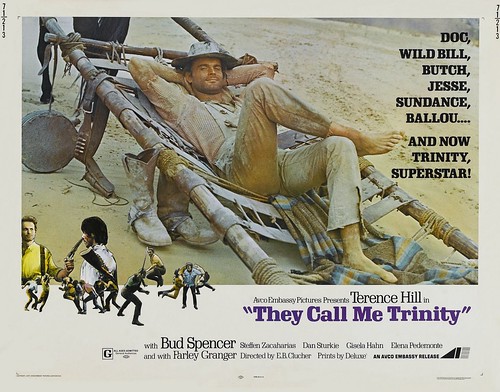





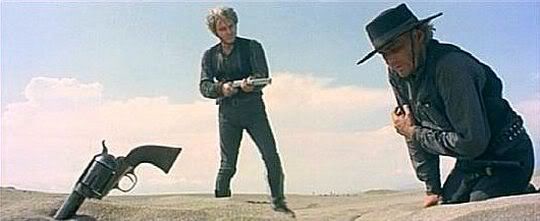



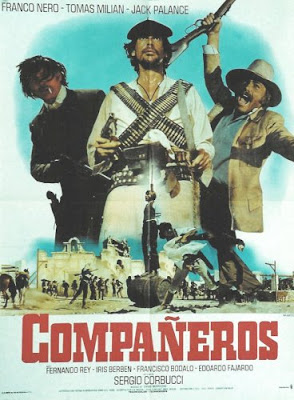











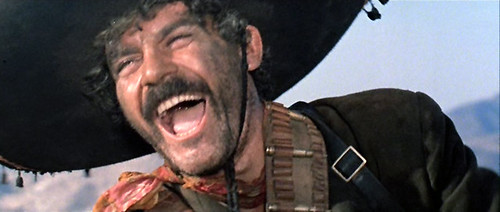
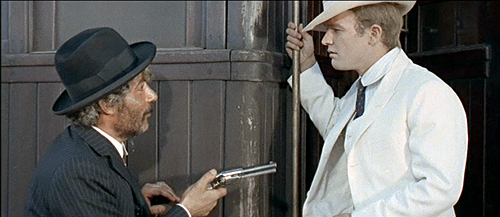




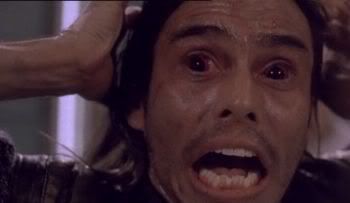
 Originally posted in movie tab II 16-06-2009.
Originally posted in movie tab II 16-06-2009.

